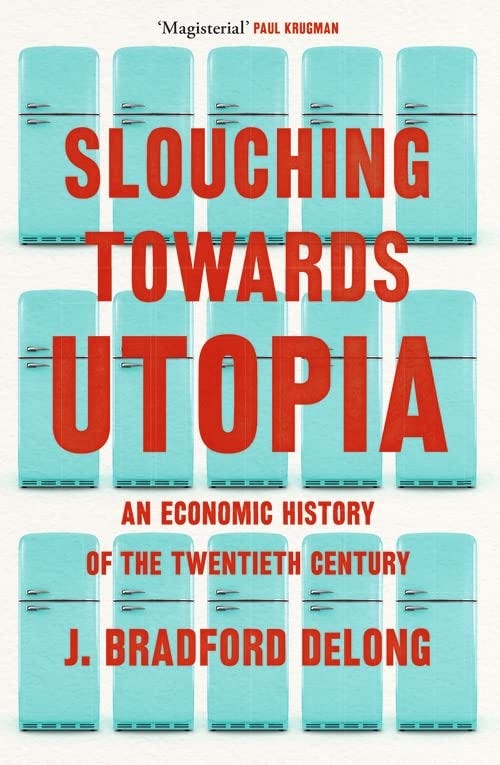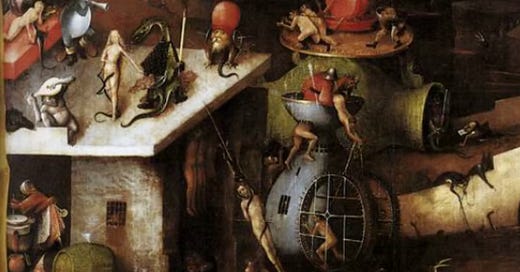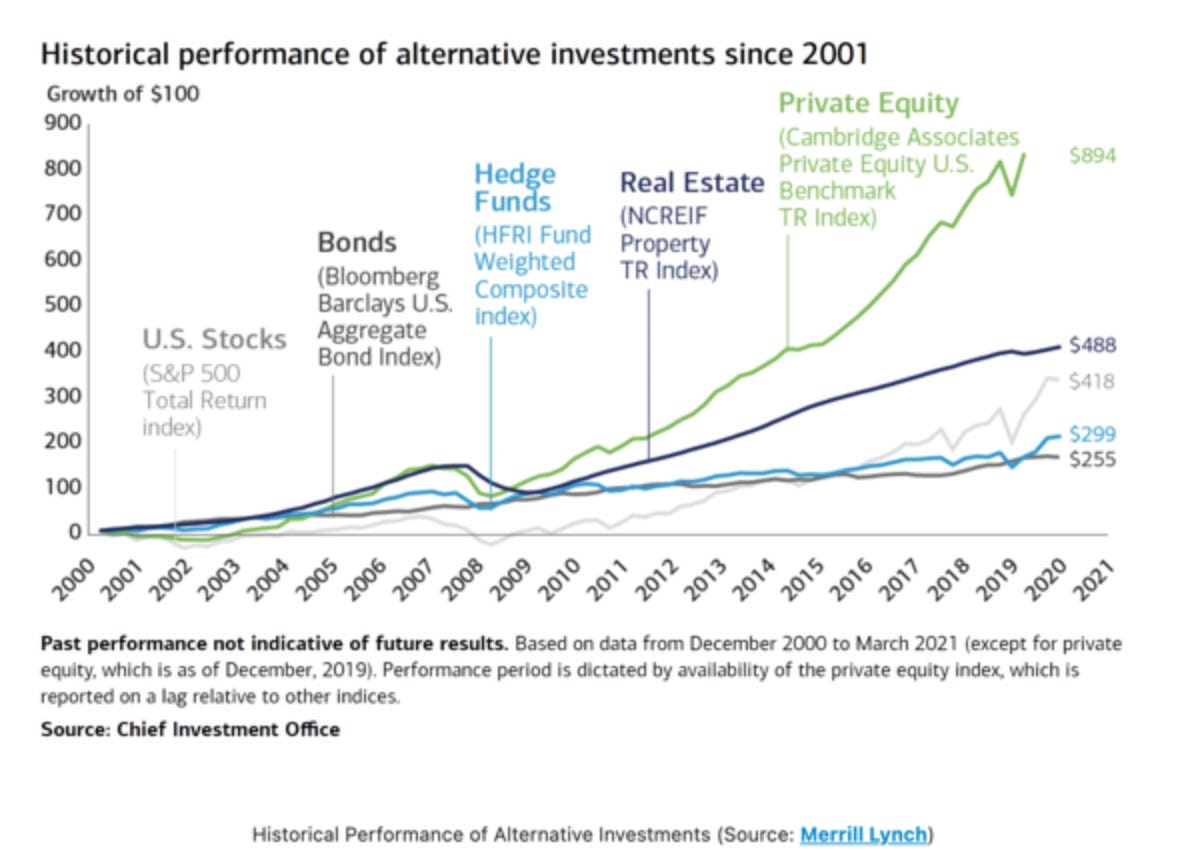FIRST: Back to the Future with "The Verge"!
From my pespective most interesting thing to cross my desk this morning:
Nilay Patel: Welcome to the New Verge: ‘Revolutionizing the media with blog posts…. Our own platform should be an antidote to algorithmic news feeds…. The Verge’s homepage is the single most popular page at Vox Media, and it should be a statement about what the internet can be at its best. So we… landed on: well s—-, we just need to blog more…. Our plan is to bring the best of old-school blogging to a modern news feed experience and to have our editors and senior reporters constantly updating the site with the best of tech and science news from around the entire internet…. We can embed anything, actually: I’m particularly excited that we can directly point people to interesting threads on Reddit and other forums. The internet is about conversations, and The Verge should be a place to find great conversations…
And:
Ben Thompson: An Interview with “The Verge” Editor-in-Chief Nilay Patel About Building a Destination Site: ‘Talk[ing] with Patel about the thinking that went into this new approach, which… I think is very smart…. NP: We have this very unique asset… a huge home page audience…. We built the quick post editor…. We’re like, “We just built a really nice tool” and our reporters are like, “Yes, we would prefer to use this tool”…. Every time you open The Verge, you know it’s going to be good because we are going to make it and you know that we’ll not have the noise of a social media platform. If we… say our competition is Twitter instead of Wired. Even if we’re a little bit successful, we’re going to be really successful…. My joke is, “We’re going to revolutionize the media with blog posts”… bring back this… reverse chronological feed of good stuff…
Naturally, I'm very enthusiastic about this. I wish them well. I am primed to hope and expect their success. So, naturally, Ithen must ask the natural question of a Dismal Scientist: If this is the way to go, why haven't people made lots of money doing it before? Why the shift to the social media hellscape in the first place?
I think the shift to the social media hellscape took place because websites failed to become “destination sites”—failed to offer, in Ben Thompson’s words, “compelling content of consistently high quality.” Instead, websites shifted to a strategy of churning out more content and throwing it against the wall to see if it stuck. The idea was that if we put up more, everyone coming to the site will find something that they like.
But it does not work that way. A smörgåsbord is outweighed by a human intention to share on social media. And then wee are into the downward spiral.
Does this have implications with what I do with this space now that the book launch is in progress? Clearly yes. What are those implications? I am not sure…
One Image:
Very Briefly Noted:
Alexander Salazar: ‘Great read [Slouching Towards Utopia] so far. Giving flashbacks of Econ 1 when Prof. DeLong’s syllabus perplexed us Freshmen by including books about anthropology, social psychology, and neoliberalism (forcing avowed Berkeley leftists to read Milton Friedman). Quite the revelatory course around 2010…
Tristan Bove: Why You Should Be Happy About Inflation & Worried About Something Else, Top Economist Brad DeLong Says
Jenny Blair: Study: More Than 335,000 Lives Could Have Been Saved During Pandemic if U.S. Had Universal Health Care
Daniel Immerwahr: Polanyi in the United States: Peter Drucker, Karl Polanyi, and the Midcentury Critique of Economic Society
Ödön Pór: Fascism
Ödön Pór & F.M. Atkinson: Syndicalism
Barry Ritholtz: 10 Sunday Reads: ‘Avert your eyes! My Sunday morning look at incompetency, corruption and policy failures…
Joe Conason: What We Can Still Learn From Kenneth Starr
Jill Lawrence: If you care about your country and your rights, don't vote for any Republicans in 2022 <https://www.usatoday.com/story/opinion/columnists/2022/09/18/dangerous-2022-elections-abortion-voting-democracy/10368442002/>: ‘Do reality-based Republicans deserve to win? Maybe. But could America survive a GOP House unscathed? Also maybe, and that’s not good enough…
Twitter & ‘Stack:
Steve Vladeck: ‘Founding-era ambivalence over whether the Attorney General was an officer of the executive branch or an officer of the courts (or a weird hybrid of both). The Judiciary Act of 1789 (which created the AG) didn't expressly resolve it...
 This is fascinating. It's also consistent with Founding-era ambivalence over whether the Attorney General was an officer of the executive branch or an officer of the courts (or a weird hybrid of both). The Judiciary Act of 1789 (which created the AG) didn't expressly resolve it.Here’s something quite amazing. The OLC wrote a powerful memo explaining why the Attorney General's independence is vital to our constitutional system. It reads as if it had been drafted this morning, in response to today’s political landscape, but …. /1 https://t.co/ieOeIsAvBe https://t.co/ssAKk7b7sR
This is fascinating. It's also consistent with Founding-era ambivalence over whether the Attorney General was an officer of the executive branch or an officer of the courts (or a weird hybrid of both). The Judiciary Act of 1789 (which created the AG) didn't expressly resolve it.Here’s something quite amazing. The OLC wrote a powerful memo explaining why the Attorney General's independence is vital to our constitutional system. It reads as if it had been drafted this morning, in response to today’s political landscape, but …. /1 https://t.co/ieOeIsAvBe https://t.co/ssAKk7b7sR Jameel Jaffer @JameelJaffer
Jameel Jaffer @JameelJaffer
Adrian Hon: Book 39: Slouching Towards Utopia: An Economic History of the Twentieth Century by Brad DeLong. Excellent, clear, and funny, using sci-fi counterfactuals and tales of individuals to illustrate the last 150 years of economic history. Like Sapiens in its scope – but good!…


¶s:
Daniel Williams: The focus on Misinformation Leads to a Profound Misunderstanding of Why People Believe and Act on Bad Information: ‘A better framework… focuses… on motivated reasoning and rationalisation markets. Human beings are rational and vigilant – but only when our goal is to form accurate beliefs. We are also motivated to believe things for their emotional, social, or material benefits. This process of motivated reasoning is subject to a rationalisation constraint, however: to believe what I want to believe whilst maintaining an illusion of objectivity, I must acquire evidence and arguments that rationalise my desired conclusions. Ambitious individuals and firms compete to produce intellectual ammunition for society’s political and cultural factions…. The result is… an emergent marketplace of rationalisations. Ambitious individuals and firms compete to produce intellectual ammunition for society’s political and cultural factions. In return for their often-intense cognitive labour, the winners of such competition receive attention, status, and financial rewards…
Guido Franzinetti: Karl Polanyi's Fascist Cousin Ödön Pór <http://italogramma.elte.hu/wp-content/files/Guido_Franzinetti_Odon_Por.pdf >: ‘Peter Drucker (the Austrian economist turned long-standing management guru in the USA) provided in his memoirs an interesting, if unreliable, recollection of the family of Károly and Mihály Polányi. Amongst others, he mentions one of the Polányi brothers, supposedly called Otto…. The number of inaccuracies, exaggerations and falsehoods… is difficult to quantify…. This does not mean that Drucker’s garbled recollections are entirely useless; indeed, most are based on fact. “Otto Polanyi” really existed. He was not the brother of Karoly and Mihály, but their cousin. His name was in fact Ödön Pór (which explains how Drucker garbled the name). He was the son of Teréz Pollacsek (Károlyi Polányi’s aunt), and was born in 1883. He died in in Italy in 1971…. His life may classified under a series of headings: (i) Hungarian Socialism at the beginning of the XXth century; (ii) Italian Socialism and its crisis during the First World War; (iii) Early Fascism (1922–1929); and (iv) Fascism in its phase of consolidation (1929–1940)…. The book he published… Fascism… presented… by the magazine Mask in the following glowing terms: “FASCISM by Odon Por, Translated by E. Townshend. The Labour Publishing Co. Ltd. 7/6…. A clear and practical book, showing in what way Labour is closely connected with Fascism: showing also how Fascism possesses what Labour “has not… the power of appealing to the imagination of a people, provided imagination has not been utterly condemned as a worthless quality by the people’s rulers…
Michael Spagat: ‘This hardly qualifies as BigTime wrong but I do think that you're a bit harsh on Norman Angell although it does seem plausible that his is the saddest book on your shelf…. He belaboured his argument to the point of tedium. Conquest is counterproductive. Economic progress is available through peaceful cooperation. He makes the argument standing on one leg, standing on his head, hanging from a tree branch, etc. But why the overkill? I think the answer lies in the fact that he saw scores of influential people all around him still in thrall to the Great Illusion. That is, he was fighting a desperate uphill battle. It's true that at times he does seem succumb to an optimistic view that people will finally get it. I think that this is the origin of the stain permanently affixed to Angell's reputation claiming that he predicted the impossibility of future war right before WW1 broke out…. For people trained in a rational choice tradition, as we certainly were in economics, it's a small step to say that people will avoid doing something that will harm them…. We should distinguish between: 1. an argument that starting a war would be stupid; and 2. an argument that war is impossible. Angell occasionally slipped from 1 to 2 but, broadly, I think that he saw the danger of a big war and made a cogent case to prevent it, albeit to no avail (so, yes, it's the saddest book on your shelf)…


Tiago Santos: ‘I love Jared C. Rubin and Mark Koyama’s book, but this thread impels me to write about a tendency in development economics I think is negative: an all encompassing "anti silver-bulletism". My point is not to defend silver bullets; like everyone, I agree they don't exist. A true "silver bullet" would imply something which is both necessary and sufficient for development to happen. Such things just aren't there, not only in dev econ…. Matt Yglesias talks about the surprising lack of attention to breakthroughs in obesity treatment…. We're stuck in a dead-end debate over body positivity and dieting when real solutions to the problem exist. As Matt points out, effective obesity treatments in general have a negative reception among most people. They are seen as an "easy way out". The overwhelmingly dominant approach is to recommend a change in life habits. If a person has good habits, then they will be thin. The problem is that such recommendations just don't work…. Surgery, semaglutide, on the other hand, do work. And they work for the same people who could not diet and exercise their way out of obesity. They are hardly a silver bullet either. On average, people lose 15% of their weight with semaglutide. As the word "average" implies, this means some people will lose less than that. So my recommendation for development economists is to talk more about the "semaglutides" of development. Interventions which will on average make a significant difference, even if they are not the impossible single solution to a society's problems…









